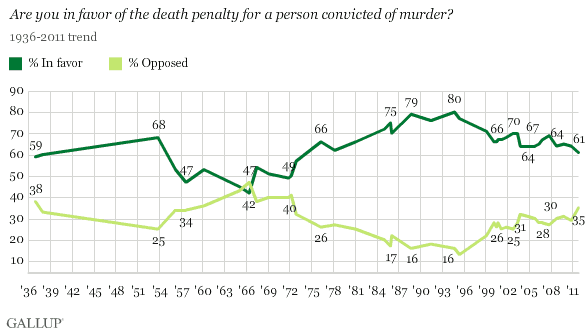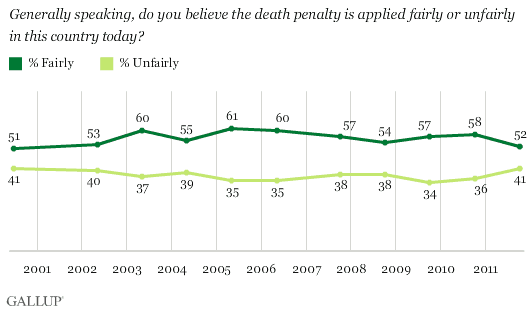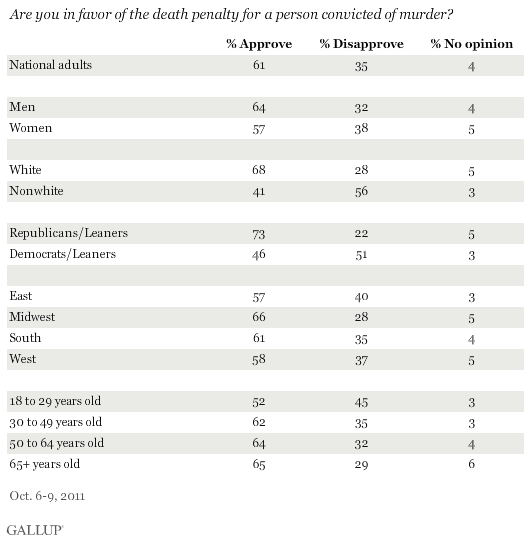PRINCETON, NJ -- Sixty-one percent of Americans approve of using the death penalty for persons convicted of murder, down from 64% last year. This is the lowest level of support since 1972, the year the Supreme Court voided all existing state death penalty laws in Furman v. Georgia.

Gallup first asked about use of the death penalty in murder cases in 1936. At that time, 59% of Americans supported it and 38% opposed it. Americans' views on the death penalty have varied significantly over the 75 years since, including a period from the late 1950s to the early 1970s when less than a majority of Americans favored it. Support climbed to its highest levels from the mid-1980s through the mid-1990s, including the all-time high of 80% who favored the death penalty in 1994. Since then, support has gradually declined; this year's measure of 61% marks a 19-percentage-point drop over the past 17 years, and a 3-point drop from last year's measure.
The Oct. 6-9 poll was conducted shortly after the execution of Troy Davis in Georgia, which generated widespread protests and extensive news coverage. This could help explain the slight drop in support for the death penalty this year. However, there have been high-profile executions in the news in previous years without concomitant drops in death penalty support, making it less clear that such events have a direct impact on attitudes.
Less Than Half Say Death Penalty Not Imposed Often Enough
This year, 40% of Americans say the death penalty is not imposed often enough, the lowest such percentage since May 2001, when Gallup first asked this question. Twenty-five percent say the death penalty is used too often, the highest such percentage yet that Gallup has measured. The rest (27%) say the death penalty is imposed about the right amount.
![2001-2011 trend: In your opinion, is the death penalty imposed -- [too often, about the right amount, or not often enough]?](http://content.gallup.com/origin/gallupinc/GallupSpaces/Production/Cms/POLL/-km8pp21jk6jtzxvhyh0ua.gif)
Similarly, attitudes about how fairly the death penalty is applied in the U.S. have become less positive this year. Fifty-two percent of Americans say the death penalty is applied fairly in this country, down from 58% last year, but similar to the 51% who felt this way in June 2000.

Republicans, Those in Midwest and South Most Likely to Express Support for Death Penalty
Support for the death penalty is highly partisan in nature. Almost three-quarters of Republicans and independents who lean Republican approve, compared with 46% of Democrats and independents who lean Democratic. Additionally, men, whites, and those living in the South and Midwest are among those most likely to support the death penalty. Americans younger than age 30 are less likely to support the death penalty than are those who are 30 and older.

Bottom Line
Support for the death penalty in cases of murder has varied substantially over the past 75 years. A majority of Americans supported the death penalty when Gallup first asked about it in 1936, and less than a majority supported it in various Gallup polls between 1957 and 1971, but support has returned to a majority level since. Support peaked in the 1990s as concerns about crime rose, but since that point it has declined, although a clear majority of Americans still favor its use in cases of murder.
Recent years have seen renewed controversy over the death penalty's use, including the 2010 execution of Teresa Lewis in Virginia, the first woman to be executed in that state in almost 100 years, and the execution of Davis in September of this year. It is not clear whether the death penalty will be an issue in next year's presidential race, although Texas Gov. Rick Perry was asked in a recent Republican debate about his state's status as the most frequent in carrying out the death penalty.
A separate Gallup trend question, not asked this year, explicitly offers respondents the opportunity to choose between the death penalty and life imprisonment with no possibility of parole, and last year's update found about half of Americans preferring the latter option. On the other hand, Gallup has found support for the use of the death penalty rising when Americans are asked about specific cases involving high-profile mass killings, such as the Oklahoma City bomber, Timothy McVeigh.
Survey Methods
Results for this Gallup poll are based on telephone interviews conducted Oct. 6-9, 2011, with a random sample of 1,005 adults, aged 18 and older, living in all 50 U.S. states and the District of Columbia.
For results based on the total sample of national adults, one can say with 95% confidence that the maximum margin of sampling error is ±4 percentage points.
Interviews are conducted with respondents on landline telephones and cellular phones, with interviews conducted in Spanish for respondents who are primarily Spanish-speaking. Each sample includes a minimum quota of 400 cell phone respondents and 600 landline respondents per 1,000 national adults, with additional minimum quotas among landline respondents by region. Landline telephone numbers are chosen at random among listed telephone numbers. Cell phone numbers are selected using random-digit-dial methods. Landline respondents are chosen at random within each household on the basis of which member had the most recent birthday.
Samples are weighted by gender, age, race, Hispanic ethnicity, education, region, adults in the household, and phone status (cell phone only/landline only/both, cell phone mostly, and having an unlisted landline number). Demographic weighting targets are based on the March 2010 Current Population Survey figures for the aged 18 and older non-institutionalized population living in U.S. telephone households. All reported margins of sampling error include the computed design effects for weighting and sample design.
In addition to sampling error, question wording and practical difficulties in conducting surveys can introduce error or bias into the findings of public opinion polls.
View methodology, full question results, and trend data.
For more details on Gallup's polling methodology, visit www.gallup.com.
